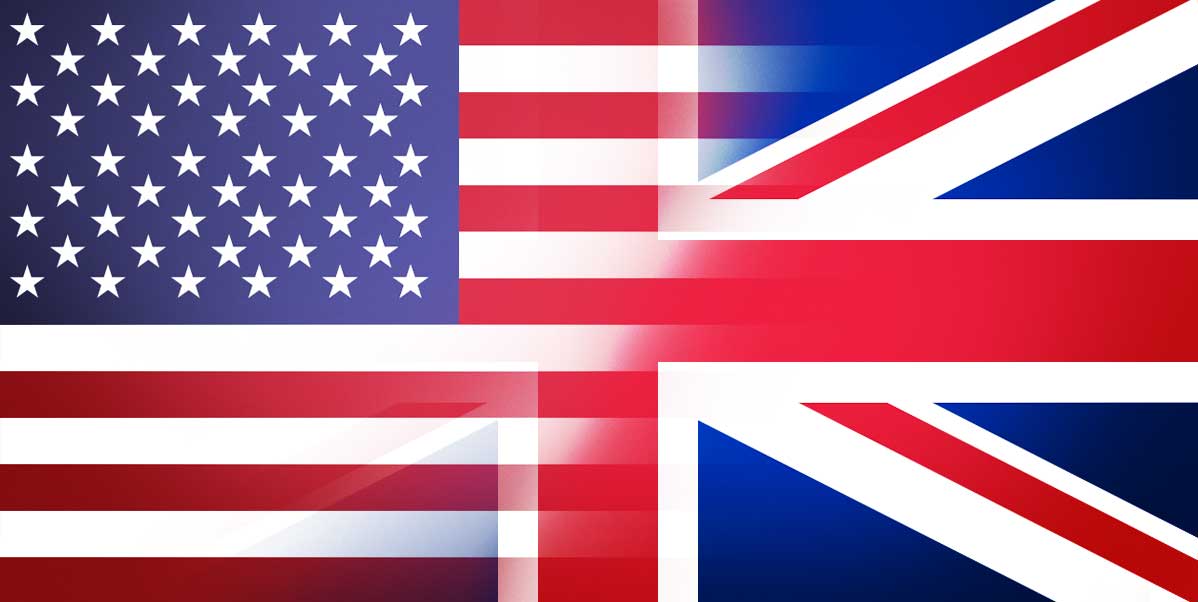There is an old saying that America and Britain are “two nations divided by a common language.”
Basic differences
Vocabulary
The most noticeable difference between American and British English is vocabulary. There are hundreds of everyday words that are different. For example, Brits call the front of a car the bonnet, while Americans call it the hood.
Americans go on vacation, while Brits go on holidays, or hols. New Yorkers live in apartments, Londoners live in flats.
There are far more examples than we can talk about here. Fortunately, people can usually guess the meaning through the context of a sentence.

Grammar
Collective nouns
There are a few grammatical differences between the two varieties of English. Let’s start with collective nouns. We use collective nouns to refer to a group of individuals.
In American English, collective nouns are singular. For example, staff refers to a group of employees; band refers to a group of musicians; team refers to a group of athletes. Americans would say, “The band is good.”
In British English, collective nouns can be singular or plural. You might hear “The team are playing tonight” or “The team is playing tonight.”
Auxiliary verbs
Another grammar difference between American and British English relates to auxiliary verbs. Auxiliary verbs “help” the main verb by adding information about time, modality and voice.
For example the auxiliary verb shall: Brits sometimes use shall to express the future.
For example, “I shall go home now.” Americans know what shall means, but rarely use it in conversation. It seems very formal. Americans would probably use “I will go home now.”
In question form, a Brit says, “Shall we go now?” while an American would say, “Should we go now?”
When Americans want to express a lack of obligation, they use the helping verb “do” with negative ”not” followed by need. “You do not need to come to work today.” Brits drop the helping verb and contract not. “You needn’t come to work today.”

Past tense verbs
There are also some small differences with past forms of irregular verbs.
The past tense of learn in American English is learned. British English has the option of learned or learnt. The same rule applies to dreamed and dreamt, burned and burnt, leaned and leant.
The present perfect is less common in American English than British English.
American English speakers often use the past simple in situations where British speakers use the present perfect, especially with words such as already and yet:
- Did I already ask you that? /AE/
- Have I already asked you that? /BE/
- Did they pick the golf team yet? /AE/
- Have they picked the golf team yet? /BE/
In the past participle form, Americans tend to use the “-en” ending for some irregular verbs. For example, an American might say, “I have never gotten caught” where a Brit would say, “I have never got caught.” Americans use both got and gotten in the past participle. Brits only use got.
The past perfect
The past perfect is more common in American English, especially in situations where the speaker sees one event as happening before another in the past:
- Did you watch it? /AE/
- We had watched it, uh, I guess Sunday night and Monday night, but we didn’t get to watch it tonight. /BE/
Prepositions
At the weekend/on the weekend
British English speakers prefer at the weekend as American English one prefers on the weekend:
- In/for
- I haven’t really read anything like that in years. /AE/
- I haven’t really read anything like that for years. /BE/
- In and on with street names
- They were a lovely family. They lived in Walton Street. /BE/
- I used to live on Perot Street. /AE/
Through
American uses through in many situations where Brit prefers to or till when referring to the end points of periods of time:
- And that’s Monday through Friday? /AE/
- from Monday to Friday /BE/

Adjectives and adverbs
Really, real
In informal spoken American English, speakers often use real instead of really before an adjective. This is considered non-standard by many American English speakers:
- That’s real funny! /AE/
- Really funny! /BE/
- I thought it was a real good movie. /AE/
- I thought it was a really good film! /BE/
Well and good
American speakers often use good where British prefer well. However, the American form is becoming more common in British English, especially after greetings such as “How are you?”, “How’s it going?”
Likely
American allows the use of likely as an adjective (in the same way as probable, possible, etc.), or as an adverb (in the same way as probably, possibly, etc.). In British, likely is normally only used as an adjective.
Tag questions
A tag question is a grammatical form that turns a statement into a question. For example, “The whole situation is unfortunate, isn’t it?” or, “You don’t like him, do you?
Americans use tag questions, too, but less often than Brits.
Spelling
There are hundreds of spelling differences between British and American English. You can thank American lexicographer Noah Webster for this. You might recognize Webster’s name from the dictionary that carries his name.
Noah Webster, an author, politician, and teacher, started an effort to reform English spelling in the late 1700s.
He was frustrated by the inconsistencies in English spelling. Webster wanted to spell words the way they sounded. Spelling reform was also a way for America to show its independence from England. You can see Webster’s legacy in the American spelling of words like color (from colour), honor (from honour), and labor (from labour). Webster dropped the letter u from these words to make the spelling match the pronunciation.
British and American English have far more similarities than differences. We think the difference between American and British English is often exaggerated.
With the exception of some regional dialects, most Brits and Americans can understand each other without too much difficulty.

